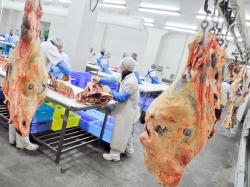How Canada Cut Foreign Workers And Hobbled Its Meat Industry
February 17, 2017 | 1 min to read

For a glimpse at how Donald Trump’s “America first” approach to immigrants may affect the meat industry in the U.S. — the world’s largest beef producer — look no further than across the northern border to Canada.
Three years after former Prime Minister Stephen Harper tightened restrictions on foreign workers to force employers to hire more Canadians, processors from British Columbia to Nova Scotia say the move compounded a labor shortage from which they have not recovered. The Canadian Meat Council estimates the industry has 1,650 vacancies at 19 rural abattoirs, or 9 percent of total employment at those facilities.
Carving up carcasses and packaging meat is messy, physically demanding work. And while workers get health and other benefits, the starting pay is below the national average. That’s why the $24.1 billion ($18.4 billion) Canadian industry — like its neighbor in the U.S. — has grown increasingly dependent on foreign labor. Maple Leaf Foods Inc. said last year it was seeking to hire Syrian refugees to fill job shortages.
To read the rest of the story, please go to: Bloomberg
